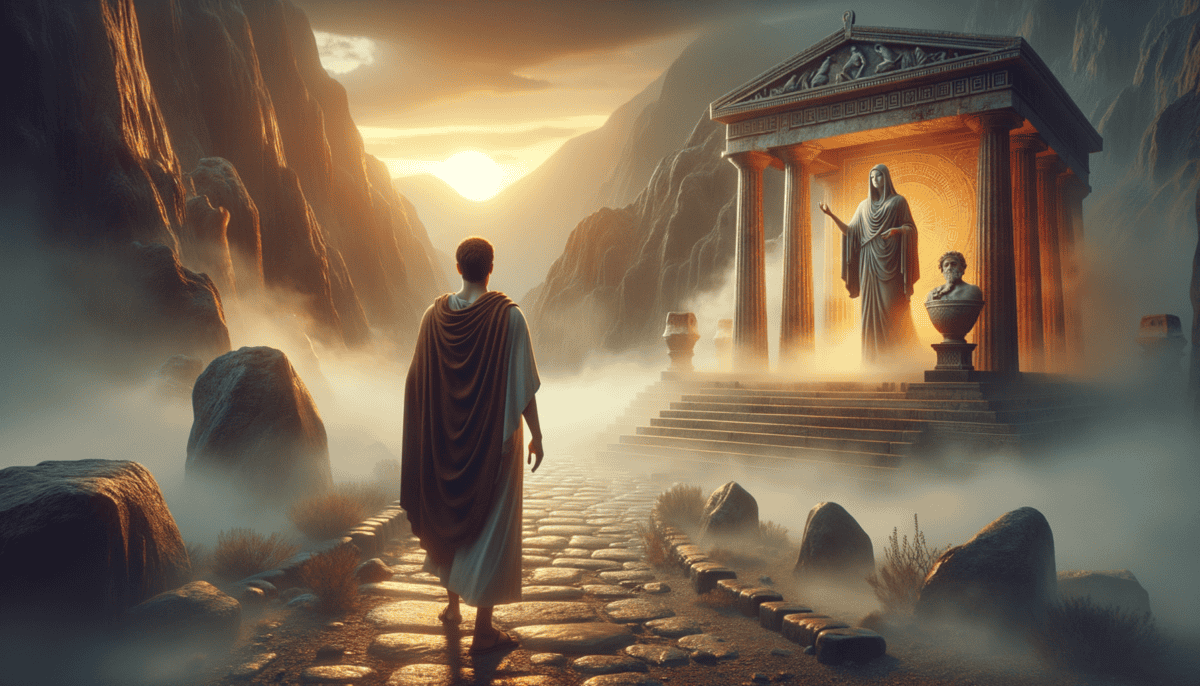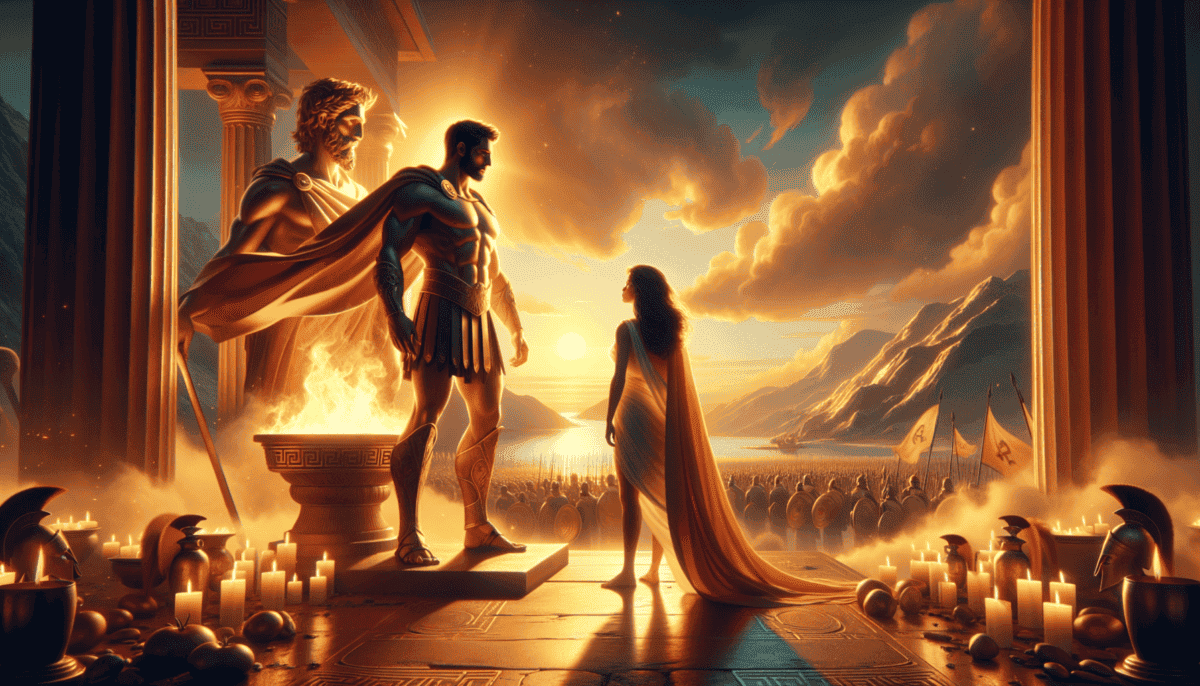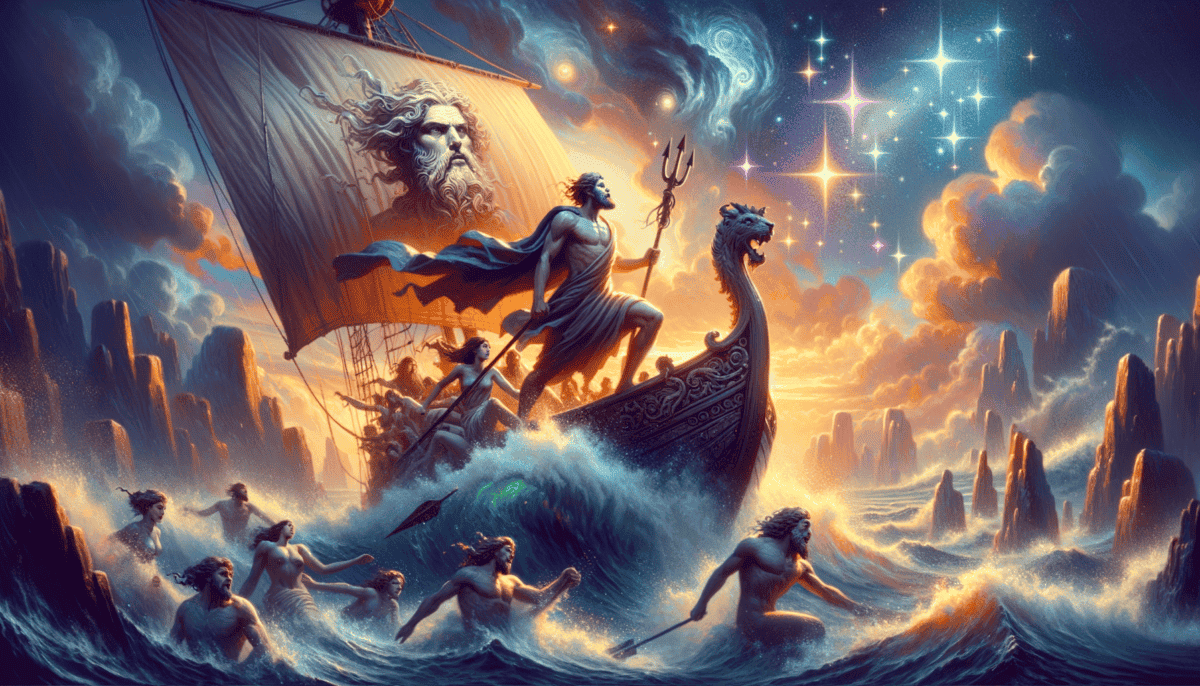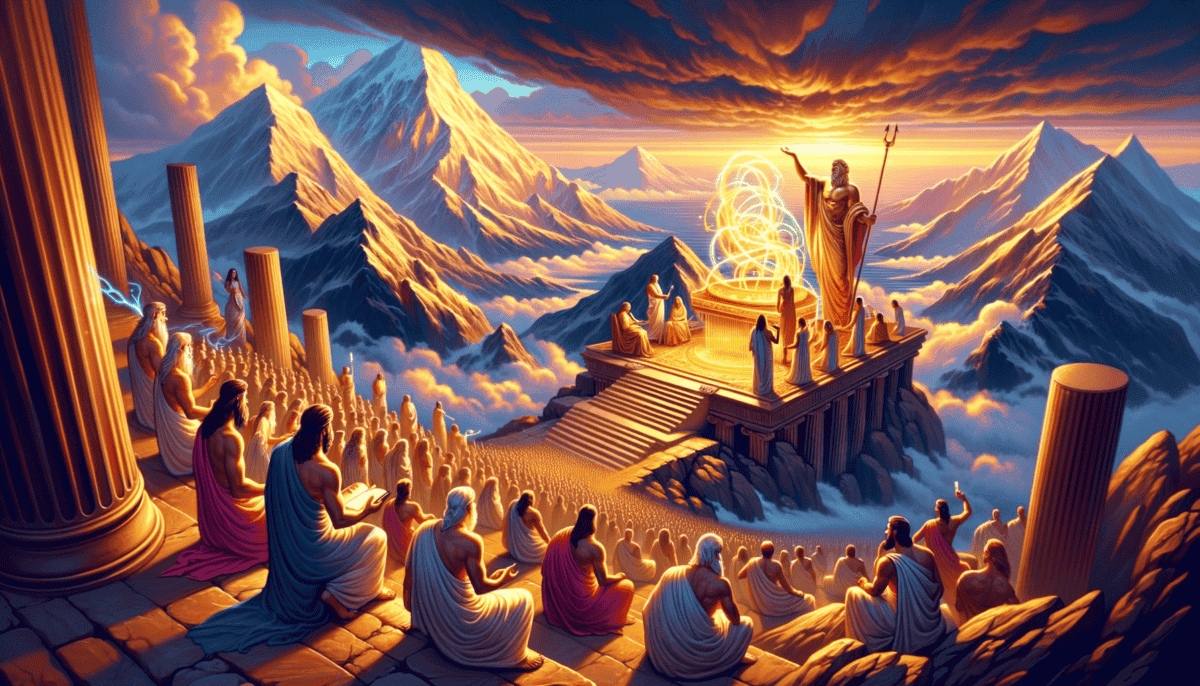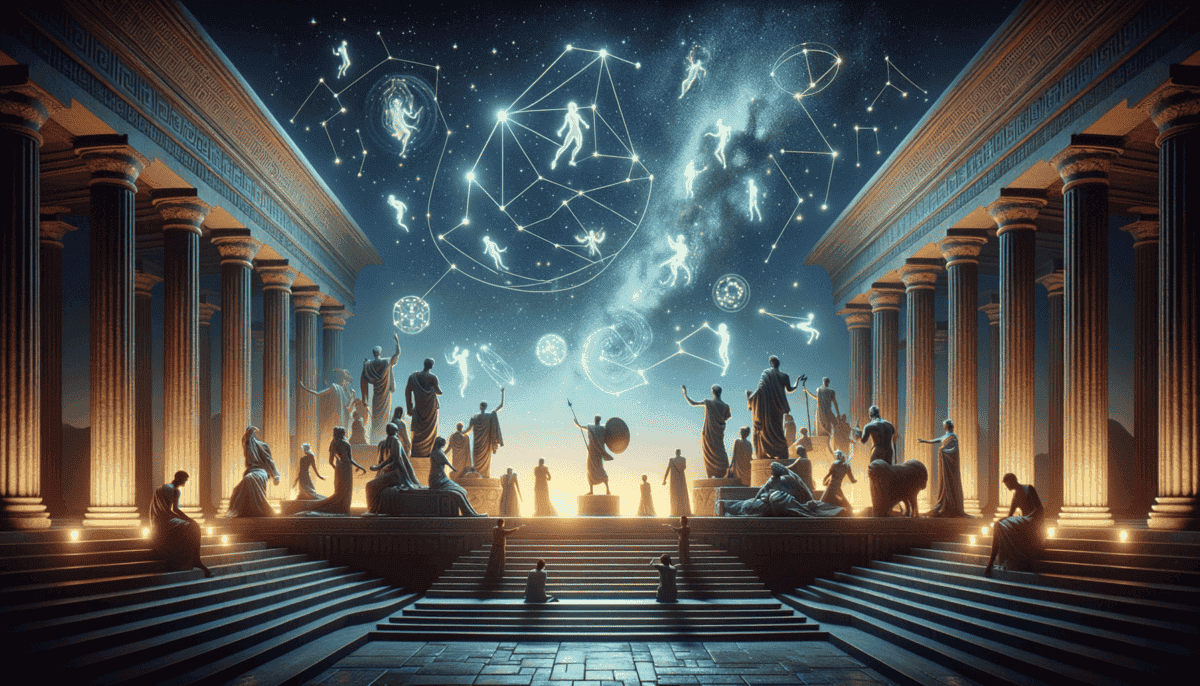The Threads of Destiny
High above Mount Olympus, in a golden chamber that sparkled like starlight, three special sisters worked day and night. They were the Moirai – the Fates. These sisters had a very important job. They controlled the destiny of every person who lived!
"Look at this beautiful golden thread," said Clotho, the youngest sister. She had gentle hands that spun the threads of life. Each thread was a person's life story waiting to happen.
Lachesis, the middle sister, measured the threads with her magical rod. "This one will be a brave warrior," she said, holding up a bright red thread. "And this silver one belongs to a wise teacher."
Atropos, the eldest, sat quietly with her sharp scissors. She was the most serious of all. When it was time for someone's life to end, she would cut their thread. ✂️
Little Hermes, the messenger god, zoomed into their chamber on his winged sandals. "What are you working on today?" he asked, his eyes wide with curiosity.
"We're weaving the fate of a baby who was just born in Athens," Clotho explained. She showed him a thread that shimmered with all the colors of the rainbow.
"Can the baby choose what happens in their life?" Hermes asked, floating closer to look at the magical thread.
The three sisters shared a mysterious smile.
"That's the biggest question of all," Lachesis said, running her fingers along the thread. "We create the path, but sometimes humans find surprising ways to walk it."
"It's like a dance," Clotho added. "We lead, but humans can add their own special moves."
“The bravest heroes are the ones who face their destiny with courage,” Atropos said softly, “even when the path is hard.”
Down on Earth, people would often visit temples to ask about their fate. They would bring gifts to Apollo's oracle at Delphi, hoping to learn what the Fates had planned for them.
Some believed they could change their destiny. Others thought everything was already decided. The truth was somewhere in between, like a puzzle waiting to be solved.
The Fates kept working, their fingers moving quickly as they wove the threads of life. Each thread was connected to others, making patterns more beautiful than any tapestry.
"Every choice matters," Clotho hummed as she spun. "Every decision creates ripples in the great web of destiny."
Hermes watched in amazement as the threads glowed and danced. He could feel the power of fate and free will moving together, like waves in a mighty ocean.
The chamber filled with soft golden light as the sun began to set. The Fates would keep working through the night, weaving the stories of heroes and ordinary people alike. Each thread held mysteries and possibilities, waiting to unfold in its own special way.
A Destiny Foretold
Long ago in the grand city of Thebes, a baby prince was born. His parents, King Laius and Queen Jocasta, were overjoyed! But their happiness didn’t last long.
One stormy night, they visited the Oracle at Delphi. The Oracle lived in a special temple where she could see the future. Lightning flashed outside as she spoke words that made the king and queen tremble:
“Your son will grow up to kill his father and marry his mother.”
“We must stop this terrible fate!” cried Queen Jocasta, holding her baby close.
King Laius nodded. “We’ll send him far away. That way, the prophecy can’t come true.”
They gave baby Oedipus to a shepherd. “Take him to the mountains,” they ordered. The shepherd felt sad for the little prince. Instead of leaving him in the mountains, he gave the baby to another shepherd from a faraway kingdom called Corinth.
The kind shepherd took Oedipus to the King and Queen of Corinth. They had no children of their own and were very happy to adopt him.
Oedipus grew up thinking the King and Queen of Corinth were his real parents. He became strong and brave. He was good at solving puzzles and helping people.
One day, when Oedipus was grown up, he heard a strange whisper at a party. “You don’t know who your real parents are,” someone said.
This bothered Oedipus so much that he couldn’t sleep. He decided to visit the Oracle at Delphi himself.
“What is my destiny?” he asked the Oracle.
The Oracle told him the same scary prophecy – that he would kill his father and marry his mother.
“I must never go back to Corinth!” Oedipus decided. “I can’t let anything bad happen to my parents.” ♂️
But by trying to run away from his fate, Oedipus was actually running right toward it. On the road, he met an old man in a chariot. They got into a fight, and Oedipus killed him. He didn’t know this was King Laius – his real father!
When Oedipus reached Thebes, he found the city in big trouble. A monster called the Sphinx was asking everyone impossible riddles. If they couldn’t answer, the Sphinx would eat them!
The Sphinx asked Oedipus: “What walks on four legs in the morning, two legs in the afternoon, and three legs in the evening?”
Oedipus thought hard and answered: “A person! They crawl as a baby, walk on two legs as an adult, and use a cane when they’re old.”
The Sphinx was so upset at being solved that she disappeared forever! The people of Thebes were so happy, they made Oedipus their new king. He married Queen Jocasta, not knowing she was his real mother.
Later, when the truth came out, everyone was very sad. Oedipus had tried so hard to avoid his fate, but everything the Oracle said came true anyway.
High above on Mount Olympus, the three Fates kept weaving their threads. They knew that sometimes trying to run away from destiny only makes it happen faster. But they also knew that how we face our fate is what makes us truly brave.
The golden thread of Oedipus’s life glowed in their hands, a reminder that destiny works in mysterious ways that even the wisest can’t always understand. ✨
The Choice of Glory
The waves crashed against the shore as Thetis, a beautiful sea goddess, held her baby son Achilles. She wanted him to live forever, so she dipped him in the magic River Styx.
“My dear son will be safe from harm,” she whispered. But she held him by his heel, which didn’t touch the water. This spot would become his only weakness.
Achilles grew up to be the strongest and fastest hero in all of Greece. He could run like the wind and fight better than anyone.
One day, a wise old man told Thetis about her son’s future. He said Achilles had two paths to choose from:
“He can live a long, quiet life at home and be forgotten. Or he can fight in a great war, become famous forever, but die young.”
Thetis didn’t want to lose her son. She dressed him as a girl and hid him on a faraway island. But the clever Odysseus found him!
Odysseus brought shiny gifts to the island. Among pretty things like jewelry, he put a sword and shield. While the other kids picked up the pretty things, Achilles grabbed the weapons. His true identity was discovered! ⚔️
“Will you join us in the Trojan War?” Odysseus asked. “We need the greatest warrior in Greece.”
Achilles remembered the two choices for his life. He could stay safe and live long, or fight and become a legend.
“I choose glory,” Achilles said proudly. “I want to be remembered forever!”
In the war, Achilles was amazing! He fought like a lion and led his soldiers, the Myrmidons, to many victories.
But then something made him very angry. The army leader, Agamemnon, took away his special prize. Achilles was so mad that he stopped fighting!
“This is my choice,” he said. “I won’t fight for someone who doesn’t respect me.”
Without Achilles, the Greeks started losing. His best friend Patroclus begged him to return:
“Please, Achilles! Our friends need help!”
But Achilles shook his head. “This is about honor. I choose to stay here.”
Then Patroclus had an idea. He put on Achilles’ armor and led the soldiers himself. But this choice led to sadness – the Trojan prince Hector killed Patroclus, thinking he was Achilles.
When Achilles heard this news, he was heartbroken and angry. Now he had another choice to make.
“I know fighting Hector might lead to my death,” he said. “But I choose to fight for my friend!”
Achilles fought Hector in an epic battle. His armor gleamed in the sun as they clashed swords. In the end, Achilles won.
Later, just as the prophecy said, an arrow hit Achilles in his heel – the one spot the magic water hadn’t touched. The greatest hero of Greece fell.
But people still tell stories about brave Achilles today. He chose a short life full of glory over a long life nobody would remember. His choices shaped his fate, even though he knew what might happen.
The Fates nodded as they wove Achilles’ golden thread into their tapestry. They knew that sometimes the bravest thing isn’t fighting fate, but choosing how to face it. ⭐
The Clever Navigator
Storm clouds gathered over the wine-dark sea as Odysseus stood at his ship’s wheel. The clever hero was trying to sail home after the Trojan War, but the gods had other plans.
“I will find my way back to Ithaca,” he said firmly. “No matter what the Fates throw in my path!”
The first test came when they passed the Sirens’ island. These creatures sang songs so beautiful that sailors would crash their ships to hear more.
“I have an idea!” Odysseus told his crew. “Put wax in your ears so you can’t hear them. But tie me to the mast – I want to hear their song!”
“Captain, are you sure?” asked a sailor. “The Sirens are dangerous!”
“Trust me,” Odysseus winked. “Sometimes the best way to beat fate is to outsmart it.”
The plan worked! Odysseus heard the beautiful music but couldn’t break free from the ropes. His clever thinking had saved them all.
Next, they had to sail between two monsters: Scylla and Charybdis. One would eat sailors, while the other could sink the whole ship!
“We can’t avoid both,” Odysseus thought carefully. “But we can choose the smaller danger.”
He steered closer to Scylla. Some sailors were lost, but the ship survived. Sometimes making hard choices means picking the least bad option.
Later, they landed on an island where a giant Cyclops lived. The one-eyed monster trapped them in his cave! ️
“What’s your name?” the Cyclops asked Odysseus.
“My name is Nobody,” Odysseus said cleverly.
When Odysseus poked the Cyclops’s eye with a burning stick, the monster yelled, “Help! Nobody is hurting me!”
The other Cyclopes thought he was just being silly and didn’t come to help. Odysseus’s word trick had worked!
But this made Poseidon, the sea god and the Cyclops’s father, very angry. He sent huge waves to push Odysseus’s ship off course.
“The god of the sea works against us,” said a crew member. “Maybe we should give up?”
“No,” said Odysseus. “We can’t control the god’s anger, but we can control how we deal with it. Keep rowing!”
They faced more challenges: a witch who turned men into pigs, a whirlpool that could swallow ships, and winds that blew them backward. But each time, Odysseus found a clever solution.
When they finally saw Ithaca’s shores, Odysseus smiled. “See? The Fates said our journey would be hard, but they never said we couldn’t use our brains to help ourselves!”
Back home, Odysseus found more problems to solve. Bad men were trying to marry his wife Penelope and take his kingdom. But Odysseus had one more clever plan.
He dressed up as an old beggar so no one would know who he was. Then he watched and waited for the right moment to take back his home.
The Fates watched as Odysseus wove his own path through their tapestry. Sometimes the smartest way to deal with destiny is to use your brain to find a new route!
Divine Games
High above Mount Olympus, the gods were having a meeting. Zeus sat on his golden throne, looking down at the world of humans. Lightning flashed in his eyes. ⚡
“These mortals are getting too clever,” he rumbled. “Look at how Odysseus keeps outsmarting our plans!”
Athena, the goddess of wisdom, smiled. She had always liked Odysseus. “Maybe that’s not a bad thing, father. Humans should use their brains!”
“Nonsense!” shouted Poseidon, making the seas below churn angrily. “They should know their place!”
Apollo, the sun god, was playing his golden lyre. He stopped and said, “Why don’t we test them? Let’s see how they handle our latest challenges!”
“Yes!” agreed Aphrodite, the love goddess. “Let’s make it interesting. Like a game!”
“But remember,” said wise Athena, “humans can surprise us.”
Down on Earth, strange things started happening. The gods were playing their divine games!
In one city, Apollo made all the crops grow backwards. The farmers were scared!
“What do we do?” they cried. But then a small girl had an idea.
“If the plants grow down instead of up,” she said, “let’s dig deeper holes and plant them higher!”
Apollo clapped his hands. “See? They found a way!”
In another place, Aphrodite made everyone fall in love with the wrong person. It was very silly!
But an old woman solved it by having everyone sit down and talk about their feelings. Soon, real love beat the goddess’s spell.
Poseidon was still grumpy about Odysseus. He made a giant wave to scare some sailors.
“Ha!” he said. “Let’s see them handle this!”
But the sailors remembered Odysseus’s stories. They worked together and steered their ship safely through the storm.
The Oracle at Delphi was very busy these days. People came asking what the gods had planned.
“The gods test us,” she told them, “but they also watch to see how we grow and learn.”
Zeus scratched his beard thoughtfully. “These mortals are stronger than we thought.”
“And more resourceful!” added Hermes, the messenger god. “They keep finding new ways around our obstacles!” ✨
Athena stood up proudly. “That’s because fate isn’t just about what happens to you. It’s about how you handle it!”
Even Ares, the war god, had to agree. “They fight back in clever ways. I like it!”
The gods noticed something interesting. When they made things harder for humans, people often became stronger and smarter.
“Perhaps,” said Zeus, “this is how it should be. The Fates weave the big picture, but humans color it in their own way.”
Hera, Zeus’s wife, watched a mother teaching her child to be brave. “They learn from each other too. Each generation gets wiser!”
As night fell over Greece, the gods saw lights twinkling in every village. Each light was a family sharing stories about heroes who outsmarted fate.
Even when the gods played their tricky games, humans found ways to win. Not by fighting the gods, but by being creative and working together!
The Dance of Choice
The sun rose over Greece, painting the sky in beautiful colors. Down below, people were gathering in the town square. Something amazing was about to happen!
“Tell us a story!” the children called out to the old storyteller. Her eyes twinkled with wisdom.
“Let me tell you about fate and choice,” she began, her voice warm and gentle. “They dance together like partners in a special dance.”
She held up a colorful piece of string. “The Fates may spin our thread, but we choose how to weave it!”
“Remember brave Odysseus? He couldn’t change the storms, but he could steer his ship!
Remember clever Oedipus? He couldn’t escape his fate, but he faced it with courage!”
A little boy raised his hand. “But what about the gods? They’re so powerful!” ⚡
The storyteller smiled. “Yes, but even the gods learned something important. They learned that humans are special because we can choose how to act.”
She pulled out a small harp, like Apollo’s. “Life is like music. The notes are written, but how we play them is up to us!”
“Look at mighty Achilles! He knew his fate but chose to be a hero anyway. That was his special song!”
The children sat closer as stars began to twinkle above. The storyteller’s words painted pictures in their minds.
“The gods watch us from Mount Olympus,” she continued. “But they don’t just see what we do. They see how brave and clever we can be!”
A girl with bright eyes spoke up. “So we’re like heroes too?”
“Every day!” the storyteller laughed. “When you help others, when you try your best, when you face hard things – that’s being a hero!” ♀️
She stood up and spread her arms wide. “The Fates might spin the thread, and the gods might make the rules, but we get to write our own stories!”
Up on Mount Olympus, the gods were listening too. They smiled at the wisdom in the storyteller’s words.
“The mortals finally understand,” Zeus said softly. “Fate and free will work together, like the sun and moon.” ☀️
Athena nodded. “Each choice we make is like a brush stroke on fate’s canvas. Together, they make a beautiful picture!”
Back in the square, the storyteller looked at each child’s face. “Remember, little ones. You can’t always choose what happens, but you can always choose how to face it.”
The stars sparkled brighter, as if agreeing. In homes across Greece, parents tucked their children into bed, telling stories about heroes who made brave choices.
And so, through all the ages, the dance goes on. Fate spins its thread, the gods watch and wonder, and humans keep choosing their path, making their story more beautiful with every step.
The old storyteller’s voice grew soft. “That’s the real magic – not in the gods’ powers or the Fates’ threads, but in the choices we make every day.”
As the moon rose high, the people of Greece knew something special. They were part of a bigger story, but their choices made that story shine! ✨


